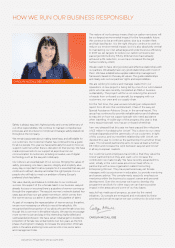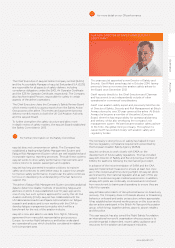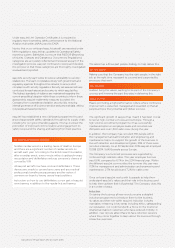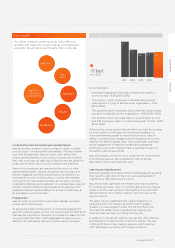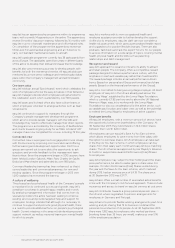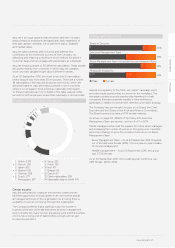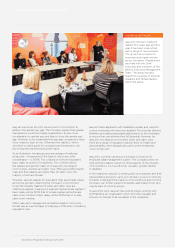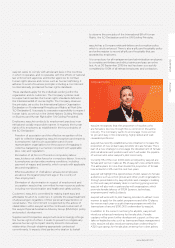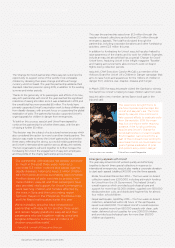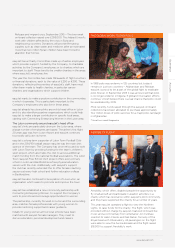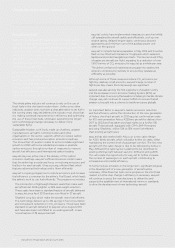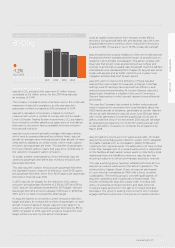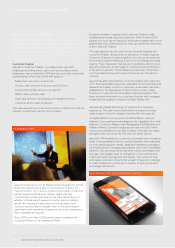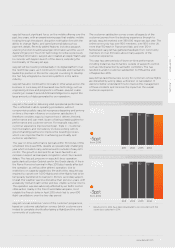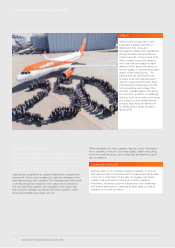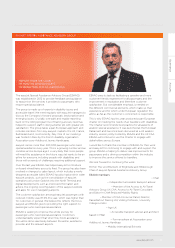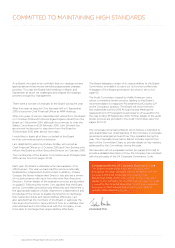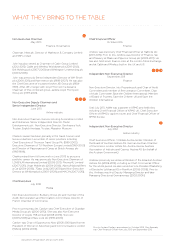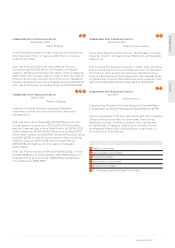EasyJet 2015 Annual Report Download - page 44
Download and view the complete annual report
Please find page 44 of the 2015 EasyJet annual report below. You can navigate through the pages in the report by either clicking on the pages listed below, or by using the keyword search tool below to find specific information within the annual report.
40 easyJet plc Annual report and accounts 2015
Corporate responsibility continued
ENVIRONMENT
easyJet continues to seek ways to reduce the
impact of its operations on the environment.
easyJet's largest cost and biggest impact on the
environment is its fuel and the associated carbon
emissions. This means that easyJet's continued
efforts to reduce its fuel usage and costs also
have the effect of reducing the airline's impact
on the environment.
Environmental concerns have an influence on
public policy towards aviation across Europe,
such as restrictions on airport expansion and
levels of passenger taxes. It is therefore also in
the Company's interest to ensure that both
easyJet and the wider industry properly
address environmental concerns.
Climate change
The whole airline industry will continue to rely on the use of
fossil fuels in the short and medium-term. Unlike some other
industries, aviation does not have a clear alternative to jet fuel in
the coming years. easyJet believes the industry must show that
it is making continual improvements in efficiency and optimising
the use of these fossil fuels, whilst also supporting the longer-
term technological change necessary to deliver more
sustainable flying.
Sustainable Aviation, a UK body made up of airlines, aviation
manufacturers, air traffic control providers and other
organisations in the sector, supports efforts to reduce carbon
emissions and has produced a carbon emissions roadmap.
This shows that UK aviation is able to accommodate significant
growth to 2050 without a substantial increase in absolute
carbon emissions through a number of measures to improve
aircraft fuel efficiency and international carbon trading.
easyJet plays an active role in the delivery of this carbon
emissions roadmap. easyJet's efficient business model means
that the airline has a continued focus on reducing emissions and
fuel burn for each aircraft. It has a young, efficient fleet which
features advanced technology and is flown efficiently.
easyJet's ongoing programme to reduce emissions and increase
fuel efficiency is overseen by the airline's Fuel Board, which leads
the airline's work to use fuel efficiently. The programme includes:
• The introduction of lightweight Recaro seats that make each
aircraft almost 600kg lighter, a 26% seat weight reduction.
These seats have been a standard feature of aircraft delivered
to easyJet since April 2013 and are now fitted in 37 aircraft.
• 'Sharklet' wing tips which make the aircraft more fuel efficient.
This technology delivers up to 4% savings in fuel consumption
and consequent reductions in CO2 emissions. These have been
standard on aircraft delivered to easyJet since August 2013
and have also been retrofitted to six existing aircraft, so are
now a feature of 38 easyJet aircraft.
• easyJet's pilots have implemented measures to save fuel whilst
still operating the aircraft safely and effectively, such as one
engine taxiing, delayed engine starts, continuous descent
approaches and minimum use of the auxiliary power unit
when on the ground.
• easyJet's cockpits became paperless in May 2014 and its entire
fleet is now fitted with Panasonic Toughpads which replaced
laptops and printed navigational charts. This has removed 27kg
of paper per aircraft per flight, equating to a reduction of over
1,900 tonnes of CO2 emissions for easyJet as a whole per year.
• The airline's enhanced maintenance programme washes the
engine's compressors routinely to ensure they operate as
efficiently as possible.
Although some of these measures reduce CO2 emissions per
flight by relatively small amounts, easyJet's large number of
flights per day means the total savings are significant.
easyJet was also among the first supporters of aviation's entry
into the European Union's Emission Trading System (ETS), an
important step to ensuring that aviation is helping to tackle climate
change. easyJet continues to support efforts to ensure that all
aviation is brought into a scheme to tackle emissions globally.
Investing in an efficient fleet
An important factor in easyJet's carbon emissions reduction
and fuel efficiency will be the introduction of the new generation
of Airbus short-haul aircraft. In 2013 easyJet confirmed an order
for 100 new generation Airbus A320neo aircraft for delivery from
2017 to 2022 and has taken purchase rights on a further 100
aircraft. These aircraft, equipped with CFM LEAP-1A engines
and wing 'Sharklets', will be 13% to 15% more fuel efficient
than existing aircraft types.
easyJet has also worked with Airbus on a new cabin design
for A320 family aircraft, which will add a further six seats, whilst
maintaining the current level of passenger comfort. The first new
aircraft with this cabin design is due to be delivered by Airbus in
May 2016 and the cabin layout is planned to be retrofitted to
existing A320 aircraft between autumn 2016 and spring 2018.
This will create the opportunity for easyJet to further increase
the number of passengers on each aircraft, contributing to
increased environmental efficiency.
To further reduce emissions in the longer term, significant progress
in the development of a new generation of aircraft will be
necessary. While there has been some progress in the short-haul
market, a further step change in efficiency is necessary. easyJet
will continue to press the manufacturers to deliver this and
supports the establishment of international minimum standards
to drive the development of new technology aircraft.


